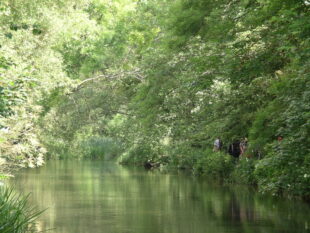All river flows vary naturally over the year, especially when we are in the summer months with some streams and smaller river tributaries drying up entirely. This is even more the case during long term dry weather, such as we experienced last summer and over the dry autumn, which reduces groundwater levels.

Chalk streams are particularly vulnerable to drier weather. Only 200 chalk streams are known globally, 85% of which are found in the UK in southern and eastern England. These streams emerge from the chalk aquifer, so the very pure water is rich in minerals and remains at a fairly constant temperature year-round. This good water quality supports many invertebrate and fish species making them an important haven for wildlife. They are highly valued culturally and provide valuable recreational fisheries.
The Environment Agency is taking action to protect chalk streams by reducing the amount of water abstracted. Water is taken from rivers to satisfy human demand for it, primarily by the water sector, the energy sector, and use by industry and for use on agricultural land. Any of these abstractions over 20 cubic metres per day require an abstraction licence from the Environment Agency. We have already changed 71 abstraction licences relating to 15 chalk streams across England. These return 16 million cubic metres per year of water back to chalk streams and remove the risk of another 8 million cubic metres per year being taken. This is equivalent to the average annual domestic water use of approximately 200,000 people, the approximate population of Oxford or Preston. We will continue to review conditions on abstraction licences where there has been a negative impact on the environment and where they may be at risk in the foreseeable future.
We are also working to maintain the water quality of these chalk streams. Chalk streams are particularly receptive to nutrient enrichment from phosphates and nitrates. Since 2006, working with Natural England, Catchment Sensitive Farming has offered a combination of grants and advice to help reduce pollution from farms within 68 priority catchments, including chalk streams, across the country. This work is in conjunction with a programme of physical habitat restoration underway on our rivers – over 1,700km of river habitat, including many kilometres of chalk stream, were enhanced in 2018/19.
There is of course much more work to do, especially in the face of a changing climate. Everyone has a role to play, particularly in reducing water consumption. That is why plans to introduce a personal water consumption target have been published by the Government today.
The proposals form part of a public consultation that examines how water can be saved on a personal level, and how industry can take a leading role in supporting customers to use less. On average, a person in England currently uses 141 litres of water per day. Our tap water comes direct from the ground, and our lakes and rivers where it supports wildlife. It is only by reducing the amount of water we all use that we can reduce pressure on the environment and avoid future water shortages.

7 comments
Comment by Christopher Holman posted on
Protect our streams from sewage pollutin and water removal from our aquifers.
Thames water should be Nationalised.
Comment by MIKE innes posted on
where can i find data that showa amount of water absstracted from our chalk streams please
Comment by eileenroffe posted on
Hello, please email our email management team to log and forward to the relevant team to collate the information. Please include as much information as possible such as dates/time periods, areas with nearest postcodes or grid references e possible. Please note our customer charter for information requests is 20 working days. Eileen
Comment by Pamela Lyman posted on
Surrey’s North Downs chalk streams are used for oil extraction (water injection wells) and eliminating radioactive waste (NORM) at Palmers Wood Godstone - a permit was provided from the Environment Agency in 2019.
Comment by Susan Green posted on
The chalk stream Ham Brook in West Sussex that runs through paddocks south of Hairspring Watercress Farm (founded circa 1970) is under threat of a development of 63 houses and a road over the stream. Amongst a rich variety of wildlife are kingfishers, grey herons, eels, water voles and several species of bat. Friends of the Ham Brook are currently recording bat activity . It is most likely the wildlife in and around the stream would be seriously adversely affected by the development and by adults, children and their pets and cars. Ways to mitigate the damage may be proposed, but it is clear damage would be unavoidable. According to WWF it is understood he Government must give a clear indication that chalk stream protection and restoration is a national priority and allocate sufficient resources. Help to prevent this development and protect the stream is much needed.
The deadline for objections is 22 September 2022.
Comment by Susan Green posted on
The planning application for this development has been delayed and may be considered in the last weeks of May/June 2023. Any advice would be appreciated.
Comment by Peter Styles posted on
Please provide me with an EA contact where I can get info on abstractions and water quality